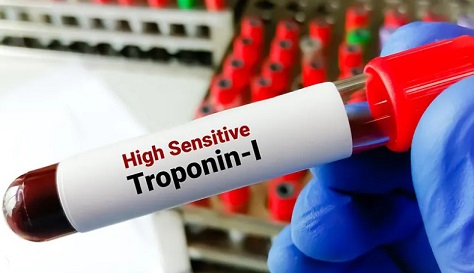Nikhil Prasad Fact checked by:Thailand Medical News Team May 23, 2024 1 year, 8 months, 2 weeks, 5 days, 8 hours, 32 minutes ago
COVID-19 News: The COVID-19 pandemic, caused by the severe acute respiratory syndrome coronavirus 2 (SARS-CoV-2), has emerged as a major global public health crisis. SARS-CoV-2 affects multiple organ systems, including the cardiovascular system, leading to both immediate and long-term cardiovascular complications. During the acute phase of infection, SARS-CoV-2 can cause direct cardiac injury by interacting with the angiotensin-converting enzyme 2 (ACE-2) receptor on various cardiac cells. This study by researchers from Vilnius University-Lithuania and Vilnius University Hospital Santaros Klinikos-Lithuania covered in this
COVID-19 News report, aimed to evaluate the prognostic value of cardiac troponin I (cTnI) levels in predicting in-hospital mortality among hospitalized COVID-19 patients.
 Elevated Cardiac Troponin I Predicts COVID-19 Mortality
Mechanisms of Cardiac Injury
Elevated Cardiac Troponin I Predicts COVID-19 Mortality
Mechanisms of Cardiac Injury
SARS-CoV-2 can cause direct cardiac injury by binding to ACE-2 receptors on cardiomyocytes, pericytes, macrophages, fibroblasts, and endothelial cells. Autopsy studies of COVID-19 patients have confirmed the presence of the SARS-CoV-2 genome in cardiac tissues. The immune response to SARS-CoV-2, resulting in a cytokine storm, may also cause direct cardiac damage. Indirect pathways of cardiac injury may involve myocardial ischemia, precipitated by conditions like tachycardia, shock, severe respiratory distress, or acute atherothrombotic incidents. Clinical manifestations of cardiac injury include myocarditis, pericarditis, arrhythmia, myocardial infarction, heart failure, right ventricular dysfunction, and Takotsubo cardiomyopathy.
Study Design and Methods
This retrospective observational cohort study included 2019 adult patients hospitalized with confirmed COVID-19 infection. Patients were stratified by cTnI levels on admission into three groups: <19 ng/L (1416 patients), 19 - 100 ng/L (431 patients), and >100 ng/L (172 patients). Myocardial injury was defined as blood serum cTnI levels increased above the 99th percentile upper reference limit. Depersonalized datasets were extracted from digital health records.
Statistical Analysis
Statistical analysis included multivariable binary logistic and Cox proportional hazards regressions to evaluate the association between cTnI levels and clinical outcomes. These outcomes included the requirement for invasive mechanical ventilation (IMV) and in-hospital mortality.
Results
Among the 2019 patients, 56% were men, with a median age of 60 years (IQR 50–69). Acute myocardial injury was observed in 29.87% of patients, characterized by elevated cTnI levels. Multivariable regression analysis revealed that age, male sex, chronic heart failure (CHF), arterial hypertension (AH), obesity, and chronic kidney disease (CKD) were associated with the development of acute myocardial injury.
Inflammatory and Biochemical Markers
Patients with elevated cTnI levels exhibited higher levels of inflammatory and p
rothrombotic markers, such as white blood cell (WBC) count, neutrophil count, glucose, creatinine, urea, aspartate aminotransferase (AST), lactate dehydrogenase (LDH), C-reactive protein (CRP), ferritin, interleukin 6 (IL-6), and D-dimer. Conversely, their lymphocyte count, estimated glomerular filtration rate (eGFR), and sodium concentration were significantly lower.
Treatment and Outcomes
Systemic steroids were administered to 67.90% of patients, with dexamethasone being the most common. Fewer patients with cTnI levels >100 ng/L received steroids compared to those with lower levels. Antibiotics were administered to 74.99% of patients, with amoxicillin and clavulanic acid being the most common. Patients with higher cTnI levels were less frequently treated with steroids and antibiotics.
Mechanical Ventilation and Mortality
The need for IMV was highest among patients with cTnI levels >100 ng/L (25%), compared to those with lower levels. The odds ratio (OR) for IMV was 3.18 for cTnI levels 19–100 ng/L and 5.38 for cTnI >100 ng/L. The in-hospital mortality rate was highest among patients with cTnI levels >100 ng/L (37.79%), compared to those with lower levels. The hazard ratio (HR) for 30-day in-hospital mortality was 2.58 for cTnI levels 19–100 ng/L and 2.97 for cTnI >100 ng/L.
Comparison with Other Studies
Several studies have reported varying prevalence rates of myocardial injury among hospitalized COVID-19 patients. Lala et al. found a 36% prevalence, while De Marzo et al. reported 25.7% among older individuals. Shi et al. documented myocardial injury in 19.7% of their cohort. This new study demonstrated a 29.87% prevalence, aligning with these findings.
Risk Factors for Myocardial Injury
Age, male sex, CHF, atrial fibrillation (AF), obesity, and CKD were significantly associated with myocardial injury. These findings are consistent with other studies. For instance, Papageorgiou et al. identified age, hypertension, and moderate CKD as independent predictors of myocardial injury. Lombardi and colleagues found associations with heart failure and a history of coronary artery disease (CAD).
Inflammatory and Thrombotic Markers
Elevated levels of inflammatory and thrombotic markers in patients with myocardial injury suggest a strong link between cardiac injury and systemic inflammation and thrombosis. Li et al. identified correlations between high sensitivity cTnI levels and IL-6, CRP, and D-dimer, further supporting this link.
Limitations
This study has several limitations, including reliance on ICD-10-AM codes for identifying comorbidities and the absence of data regarding the duration of COVID-19 symptoms prior to hospitalization. The single-center nature of the study may also limit the generalizability of the results. Future studies should aim to address these limitations and assess the long-term effects of acute myocardial injury in COVID-19 patients.
Conclusion
Cardiac troponin I serves as an effective biomarker for risk stratification in COVID-19 patients upon admission. Increased levels of cTnI, indicating myocardial injury, are associated with a more adverse clinical disease course, including a higher likelihood of requiring IMV and increased risk of in-hospital mortality. This suggests that cTnI can be a valuable tool for clinicians to identify high-risk COVID-19 patients and choose optimal monitoring and treatment strategies.
The study findings were published in the peer reviewed journal: Medicina
https://www.mdpi.com/1648-9144/60/6/842
For the latest
COVID-19 News, keep on logging to Thailand Medical News.
Read Also:
https://www.thailandmedical.news/news/norwegian-study-shows-that-cardiac-troponin-t-can-be-used-as-a-biomaker-in-moderate-to-severe-covid-19-to-determine-potential-heart-issues
https://www.thailandmedical.news/news/covid-19-news-italian-pediatricians-warn-that-infants-exposed-to-sars-cov-2-typically-exhibit-high-levels-of-troponin
https://www.thailandmedical.news/news/covid-19-clinical-care-electrocardiographic-ecg-abnormalities-and-troponin-levels-can-envisage-covid-19-mortality
https://www.thailandmedical.news/news/using-troponin-levels-to-rule-out-ischemia-is-not-reliable
https://www.thailandmedical.news/news/new-ultra-sensitive-cardiac-troponin-blood-tests-to-diagnose-heart-attacks
